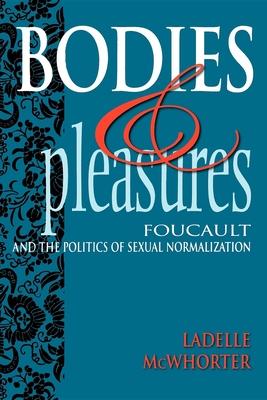Sexual identities are dangerous, Michel Foucault tells us. Categories of desire harden into stereotypes by which the forces of normalization hold us and judge us. In Bodies and Pleasures, Ladelle McWhorter reads Foucault from an original and personal angle, motivated by the differences this experience has made in her life. At the same time, her analysis advances discussion of key issues in Foucault scholarship: the genealogical critique, the status of the subject and humanism, essentialism versus social construction, and the relationships between identity, community, and political action. Weaving her own experience of coming to grips with her lesbian sexual identity into her readings of Foucault's most recent writings on sexuality and power, McWhorter argues compellingly that Foucault's texts should be read less for the arguments they advance and more for their transformative effect. By exploring bodies and pleasures--gardening, line dancing, or doing philosophy, for example--McWhorter shows that it isn't necessary to conform with socially recognized sexual identities. Bodies and Pleasures takes the reader beyond unexplored norms and imposed identities as it points the way toward a personal politics, ethics, and style that challenges our sexual selves.

Sexual identities are dangerous, Michel Foucault tells us. Categories of desire harden into stereotypes by which the forces of normalization hold us and judge us. In Bodies and Pleasures, Ladelle McWhorter reads Foucault from an original and personal angle, motivated by the differences this experience has made in her life. At the same time, her analysis advances discussion of key issues in Foucault scholarship: the genealogical critique, the status of the subject and humanism, essentialism versus social construction, and the relationships between identity, community, and political action. Weaving her own experience of coming to grips with her lesbian sexual identity into her readings of Foucault's most recent writings on sexuality and power, McWhorter argues compellingly that Foucault's texts should be read less for the arguments they advance and more for their transformative effect. By exploring bodies and pleasures--gardening, line dancing, or doing philosophy, for example--McWhorter shows that it isn't necessary to conform with socially recognized sexual identities. Bodies and Pleasures takes the reader beyond unexplored norms and imposed identities as it points the way toward a personal politics, ethics, and style that challenges our sexual selves.